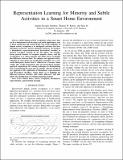Representation learning for minority and subtle activities in a smart home environment
Abstract
Daily human activity recognition using sensor data can be a fundamental task for many real-world applications, such as home monitoring and assisted living. One of the challenges in human activity recognition is to distinguish activities that have infrequent occurrence and less distinctive patterns. We propose a dissimilarity representation-based hierarchical classifier to perform two-phase learning. In the first phase, the classifier learns general features to recognise majority classes, and the second phase is to collect minority and subtle classes to identify fine difference between them. We compare our approach with a collection of state-of-the-art classification techniques on a real-world third-party dataset that is collected in a two-user home setting. Our results demonstrate that our hierarchical classifier approach outperforms the existing techniques in distinguishing users in performing the same type of activities. The key novelty of our approach is the exploration of dissimilarity representations and hierarchical classifiers, which allows us to highlight the difference between activities with subtle difference, and thus allows the identification of well-discriminating features.
Citation
Rosales Sanabria , A , Kelsey , T W & Ye , J 2019 , Representation learning for minority and subtle activities in a smart home environment . in Proceedings of the IEEE International Conference on Pervasive Computing and Communications (PerCom 2019) . , 8767417 , IEEE Computer Society , IEEE International Conference on Pervasive Computing and Communications (PerCom 2019) , Kyoto , Japan , 12/03/19 . https://doi.org/10.1109/percom.2019.8767417 conference
Publication
Proceedings of the IEEE International Conference on Pervasive Computing and Communications (PerCom 2019)
Type
Conference item
Collections
Items in the St Andrews Research Repository are protected by copyright, with all rights reserved, unless otherwise indicated.

